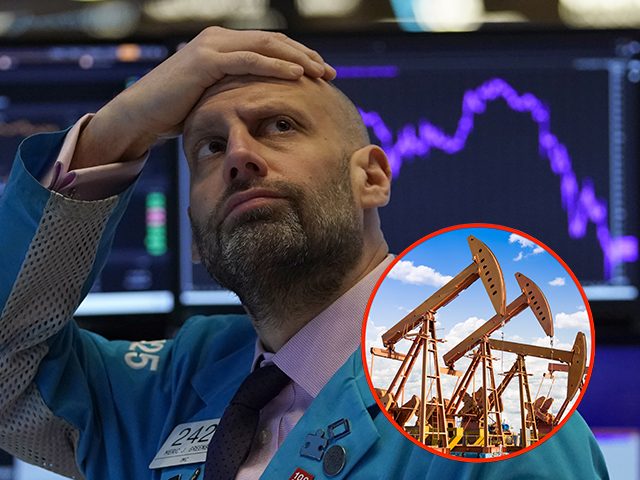Oil prices plunged on Tuesday ahead of President Joe Biden’s first trip to the Kingdom of Saudi Arabia.
Fears of a global recession played a role in Tuesday’s crash of crude. West Texas Intermediate crude futures fell by around 8.12 percent. Brent sank 7.5 percent. Both were below $100 a barrel, a psychologically and financially important benchmark that has become a kind of shorthand for the direction of the price of gasoline.

Saudi special forces salute in front of a screen displaying images of Saudi King Salman (right) and Crown Prince Mohammed bin Salman after a military parade in Mecca, Saudi Arabia, on July 3, 2022. (AP Photo/Amr Nabil)
While recession has become a favorite topic of speculation on Wall Street, there was little in the news today that particularly would have provoked the big sell-off in oil. Witness the stock market, which fared much better. None of the major indexes were down by even a full percentage point on Friday, which hints that something specific about oil was afoot.
The Organization of the Petroleum Exporting Countries (OPEC) left its forecast for growth in world oil demand unchanged at 3.4 million barrels a day in 2022. But OPEC’s monthly report sees oil-demand growth slowing next year “supported by a still solid economic performance in major consuming countries, as well as improved geopolitical developments and containment of COVID-19 in China.” Perhaps oil traders thought that was too sunny of an outlook given China’s ongoing commitment to locking down cities with outbreaks and recessions looming in Europe and the U.S.

The casino of the Wynn Macao is closed on July 11, 2022. Streets in the gambling center of Macao were empty Monday after casinos and most other businesses in the Chinese territory were ordered to close due to a coronavirus lockdown. (AP Photo/Kong)
It’s also possible the market is preparing for a breakthrough in the relationship between the Saudis and the Biden administration. So far officials have been keen to downplay expectations, telling reporters that they do not expect any major announcements about expanded oil production. This likely suits both the Saudis and the Biden administration just fine. The Saudis do not want to be seen to be pandering to a president who called them a pariah state, and the Biden White House is wary of angering its party’s climate change alarmists by pushing too hard for more oil. Even still, the Biden administration would no doubt like to be able to put points on the scoreboard for this visit, so perhaps some vague promise of more oil supply with be forthcoming.
Hot Times, Summer in the CPI
We never bought into the notion that consumer prices peaked in March or even that the rate of inflation had peaked. This belief appeared to be based on the idea that inflation was mostly a matter of snarled supply chains that would get worked out over the spring. We are convinced that inflation has become more deeply ingrained in the economy than that, fueled now by a still very hot labor market that has pumped up demand for a wide variety of goods and services.
It will not always be so. Even without central bank intervention, inflation pushes up prices of necessities, shifting demand away from discretionary purchases. This has a self-correcting tendency. Lower demand for discretionary purchases leads initially to inventory sell-offs and lower production, eventually dragging down employment. The Federal Reserve’s role here is really to accelerate this process by forcing demand to fall before high prices force it down.

Children and adults cool off at the Trago Spray Park on June 10, 2022, in Lincoln, Nebraska. (Kenneth Ferriera/Lincoln Journal Star via AP)
We expect inflation remained elevated in June. The consensus of economists is that headline Consumer Price Index (CPI) inflation rose 1.1 percent on a month-over-month basis and 8.8 percent year-over-year. The headline figure will be driven by a big jump in energy inflation and a lesser increase in food inflation, so you can expect to hear more about “Putin’s price hikes” from the Biden administration. Core CPI, which excludes energy and food, is expected to rise 0.6 percent for the month and 5.8 percent compared with 12-months ago.
In short, June inflation likely smashed the previous high hit in March to be the worst seen since December 1981.
If inflation comes in cooler than forecast, there may be some pullback in the expectations for interest rate hikes in the months ahead. Absent a big crash, the Fed is likely to stick to the planned 75-basis points hike at the July meeting. After that, however, the size of the Fed’s next moves are up for grabs and dependent on incoming data. If inflation comes in hot, the stock market will probably panic a bit, fearing even more tightening by the Fed.

COMMENTS
Please let us know if you're having issues with commenting.